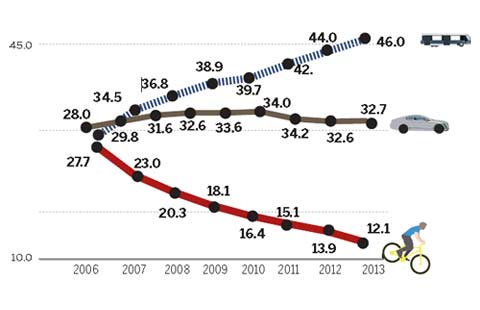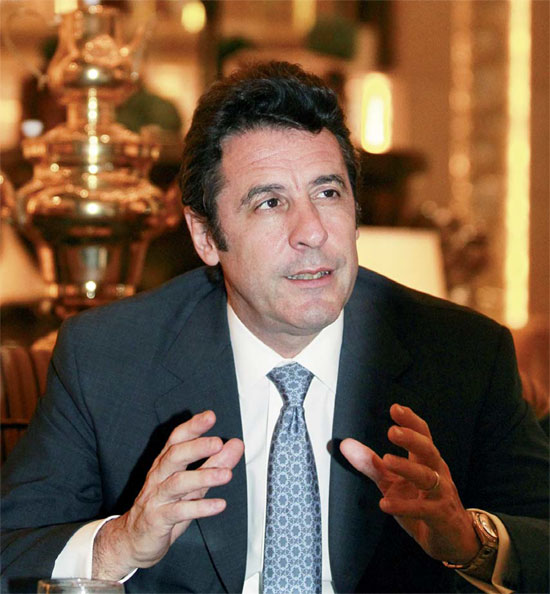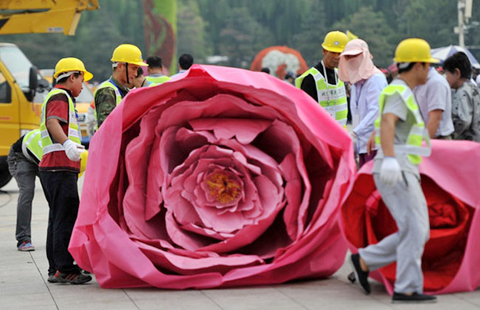Bright future for emerging economies
Updated: 2014-09-19 06:26
By Hu Haiyan(China Daily Europe)
|
|||||||||||
Former UN official hails China's role as a catalyst and supporter of multilateralism
Watching the increasing influence of the emerging economies on the global stage seems to give Carlos Magarinos as much pleasure as listening to his favorite jazz music.
"For the first time this year, emerging economies contributed over half of the world's GDP in purchasing power terms," says Magarinos, 52, former director-general of the United Nations Industrial Development Organization.
|
Carlos Magarinos says emerging economies will face a future quite different to the exceptional period they have lived through over the past decade. Zhu Xingxin / China Daily |
"The emerging economies will continue to provide two-thirds of global growth despite less dynamic performance in a more demanding financial context," says Magarinos, the honorary global chairman of the Global Alliance of Small and Medium Enterprises, based in Shanghai.
This trend seems to follow a set pattern, with a leading role for Asian economies in general and China in particular, which is both the result of and the catalyst for the emergence of a new global middle class, he says.
"By 2020 the global middle class will have grown to 1,400 million people, most living in Asia. The spending capacity of this new global middle class will experience a significant boost."
Magarinos was speaking in the lobby of the Shangri-La hotel in the Haidian district of Beijing about 9:30 pm, after a two-day conference held by Renmin University of China relating to G20 and global growth, one of those attending being former US president Jimmy Carter.
Magarinos, senior fellow at Chongyan Institute for Financial Studies of Renmin University, says there are many opportunities for emerging economies to adopt new roles and responsibilities.

"In the years to come, the quality of domestic policy will be more relevant for the emerging economies than before, as will their performance for the global economy, which will rely more heavily on the quality of their economic strategies."
In that sense. emerging economies will face a future quite different to the exceptional period they have lived through over the past decade, he says.
"Then, thanks to the growth of China, in particular, and Asia in general, almost every emerging or developing economy, whether with progressive or conservative governments, large or small, with good or less good economic policies, grew at an impressive rate."
Although policy concerns may differ among emerging economies, they share common challenges, he says.
"Exchange rate flexibility should be preserved in order to address effectively changing fundamentals and face external adjustment along with foreign exchange interventions to soften the effects of financial volatility. Fiscal balances should be improved and debt levels should be kept in check."
Magarinos has almost 30 years' experience in trade and industry, environment and international relations.
In 1993, at age 30, he was appointed state secretary of industry and mining of Argentina, the youngest person to be appointed to that post.
From 1993 to 1996 he worked to implement an economic reform program that brought down inflation, raised productivity and ultimately led to sustained economic growth in Argentina.
In 1996 he was appointed economic and trade representative to Washington, with the rank of ambassador and state secretary.
From 1997 to 2005 he served as director-general of the UN Industrial Development Organization, becoming the first Argentine to lead a UN agency.
At the helm of the organization, he implemented a reform program to improve efficiency and transparency and to update its technical cooperation program, modernizing the concept of industrial development and linking it with the fight against poverty and environmental degradation.
With these changes, the organization's technical cooperation portfolio for developing countries increased by 50 percent between 2000 and 2005. Voluntary contributions from donor countries rose 147 percent between 1998 and 2005.
Magarinos has also been active in the academic field. After graduating in business administration at the University of Buenos Aires, he continued his studies at the International Development Law Institute in Rome and at the Wharton School of University in Pennsylvania in the United States.
He taught at several universities in Argentina, including Buenos Aires, Salvador and Belgrano, and he was elected, in 2006, senior associate member of St Antony's College at Oxford University.
His interest in understanding the challenges confronting developing and emerging societies in a globalized economy led him to design and manage various research works.
He has had seven books published, in Spanish, English and French.
Magarinos says that he is very interested in China, a "big and fast-developing nation". He edited China in the WTO, the birth of a new catching up strategy with Long Yongtu, chief negotiator of China's accession to the WTO and Francisco Sercovich, famous academician, which was published in 2002 in English.
He stresses the implications for multilateralism of China's dual role in the G20 as a leading economy and, at the same time, a developing society.
The decision by the Chinese leadership to play the role of a responsible global actor contributing to multilateral solutions shows that it has not lost sight of China's many social challenges, he says.
"This is an essential asset to build a stronger multilateral system without the privileges (such as veto powers or special majorities) reserved for the winners of any new international power structure."
Normally, once countries gain leadership positions at a global level, they show little interest in multilateralism, he says, and it is not unusual to see major powers resist international treaties or agreements, arguing that they need to preserve their freedom to act.
"China's dual role may be an opportunity to see something new in multilateral affairs."
A constructive relationship between China and the US is essential for the G20 to build an effective global governance system, Magarinos says.
"Their partners at the G20 should be interested in that and avoid the temptation of attempting to use China alone to counterbalance US influence or political might or vice versa.
"On the contrary, they should try to find a way to build trust, confidence and a positive interaction for the long term, properly using the exceptional position of China as both a leading nation and an emerging economy."
Magarinos lives in Buenos Aires with his wife, two sons and a daughter.
He would like to spend more time with his family and enjoy jazz, he says, "but I am always touring, giving speeches or attending forums on emerging economies".
huhaiyan@chinadaily.com.cn
(China Daily European Weekly 09/19/2014 page32)
Today's Top News
'Yes' in Scotland could be 'maybe' for Chinese firms
Cooperation helps extradite fugitives
Xi, Modi set friendly tone for visit
Collector has 'proof' of atrocities
Naked newborn survives typhoon
How Alibaba IPO learnt from Facebook's mistake
Russia to beef up troops in Crimea
10 problems of Chinese society
Hot Topics
Lunar probe , China growth forecasts, Emission rules get tougher, China seen through 'colored lens', International board,
Editor's Picks

|

|

|

|

|

|






